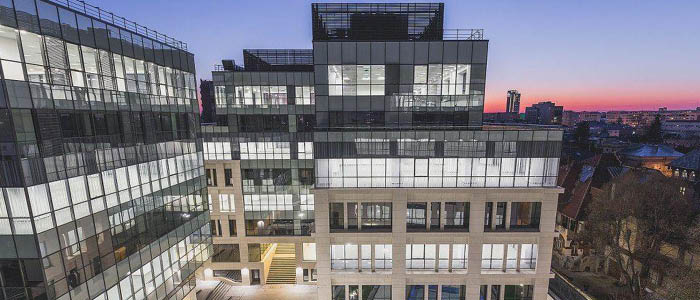Had we been writing this piece mid-February, our description of the Polish real estate market would have been consistent with the trends encompassing the past two years: despite the pandemic, two sectors continue to boom – logistics and residential, including the still relatively new professional rented sector, with many big players moving into Poland over the past few months.
Record-Breaking Residential and Warehousing
Booming e-commerce has driven the record-breaking development of the warehouse sector. The total logistics and warehouse area in Poland is now approximately 24 million square meters, with more than 4.5 million square meters of new assets under construction at the end of 2021. Some investors, who previously specialized in other types of development, are now working on their first logistics investments.
The residential market continued to grow rapidly, with the greatest rise since the 1970s and 235,000 new apartments and houses completed in 2021. What is more, total granted mortgages broke all records and amounted to EUR 19 billion (a 40% increase on 2020). However, at the end of 2021, experts warned that the decreased number of new building permits issued, together with increased interest rates and the rising costs of labor, energy, and construction materials, would make it impossible for these impressive figures to be repeated in 2022.
Evolving Office and Retail
After the booming years leading up to 2019, the situation on the office market was relatively stable, despite the huge impact of COVID-19 and online work. The total supply of modern office space in Poland reached almost 12 million square meters, with relatively stable rents, and an expected supply gap in 2023-2024 due to the drop in the number of new office projects being commenced. On the other hand, the largest single office complex transaction in CEE history has just been announced. Ghelamco has sold the Warsaw HUB office complex to its major tenant Google for the price of EUR 583 million. Also, the retail sector, which was hit by the pandemic, continued to focus rather on smaller convenience centers than on large shopping malls and galleries.
War Unleashed
Those analyses flew out the window at the end of February 2022 when Russia invaded Ukraine thus igniting Europe’s first full-scale war since 1945. Two weeks on, experts are reluctant to predict how the situation will affect the real estate market. Things are moving dynamically and the many-faceted aspects surrounding the conflict are making it difficult to pin anything down.
Several key factors will most certainly impact the market, especially the residential sector. The first visible effect of the war in Ukraine was the immediate drop in the number of apartments to rent, which is obviously related to the 1.2 million refugees that have come to Poland within the first two weeks since the Russian invasion. Some of these apartments have been rented to refugees, but a significant proportion has been made available to refugees for free, by Polish apartment owners, in an unprecedented mark of solidarity in wanting to help refugees from Ukraine. This has already impacted supply and will most probably lead to increased demand and rents.
Shifting Market
Significantly, the number of transactions on the booming individual residential market dropped in the first few days of Russia’s aggression against Ukraine, as buyers sat and waited to see how the situation in Ukraine might develop. If the war continues this could further increase the role of the PRS sector on the residential market. The other immediate effect of the Russian invasion is the slowing down of construction work since a lot of Ukrainian men – who constituted a significant proportion of construction workers in Poland – decided to return to Ukraine to fight against the Russian aggressor.
There are also other factors, like the dramatic increase in the prices of energy and construction materials as a result of sanctions imposed on Russia, as well as general inflation, increased interest rates, and the depreciation of the zloty to the euro and dollar, which will most probably lead to a decrease in supply and affordability as well as an increase in the price of apartments. However, as is the nature of the market, a shifting climate will change the approach and attitude of investors. Some will see this as a tragedy, some will see it as a blip, others as an opportunity. Time will tell.
By Przemyslaw Kastyak, Partner and Head of Construction, Penteris
This Article was originally published in Issue 9.3 of the CEE Legal Matters Magazine. If you would like to receive a hard copy of the magazine, you can subscribe here.























